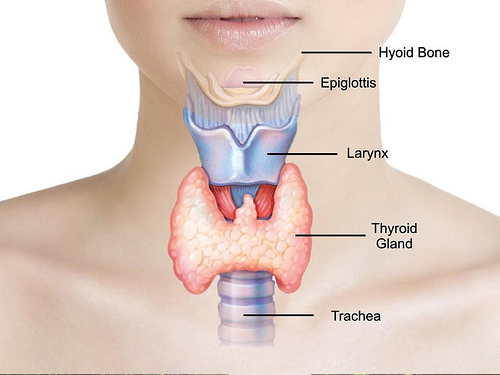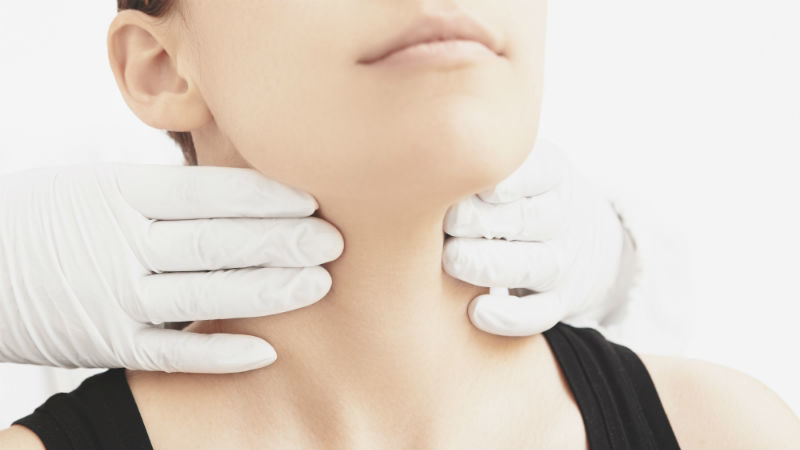Many of you have that weird idea of a swollen throat or a bulged eye, the moment you hear of the word thyroid. Well that’s the first thought you have got to wipe off your mind before you begin to understand what thyroid really is.
The thyroid is an endocrine gland situated at the root of the neck at either sides of your wind pipe or the trachea. It normally weighs about 20-30g, but it is subjected to variations even under physiological conditions.
Thyroid gland is larger in females than in males. The structure and function of the thyroid gland changed in different stages of the sexual cycle in females. Its function increases during pregnancy and lactation, while it decreases during menopause. Although its function starts at fetal life itself, the maximum activity of the gland is achieved only after puberty.
Hormones of The Thyroid Gland:
Thyroid gland secretes 3 hormones; T3 (triiodothyronine), T4 (tetraiodothyronine) and Calcitonin. T4/thyroxine forms about 90% of the total secretion while T3 covers only 10%, but T3 is 4 times more potent than T4.
What Do Thyroid Hormones Do?
Before looking into the disorders of this endocrine gland it is necessity that you understand the functional aspect of thyroid hormones along with their mode of action.
On Basal Metabolic Rate
It increases the BMR by increasing oxygen consumption of almost all tissues except retina, brain, spleen testes and lungs. In hyperthyroidism BMR increases up to 60-100% and down to 20-40% in case of hypothyroidism.
On Carbohydrate, Protein and Fat Metabolism
Thyroxin increases protein and carbohydrate metabolism by stimulating almost all of its processes like increasing cellular activity, glucose absorption, uptake and breakdown, whereas it decreases rate of fat metabolism by breaking down adipose tissue.
On Growth and Body Weight
It has a considerable role in growth, especially in children where a higher level can accelerate the growth of the body and a lower level can arrest it as well. Thyroxin is necessary for maintaining the body weight. Thus a higher level of thyroxin can reduce your body weight by increasing BMR and vice versa.
On Respiratory, Cardiovascular, Central Nervous System and Gastrointestinal Tract
Thyroxin secretion increases overall activity of the CVS and respiratory system by increasing the force and rate of respiratory system. It improves hunger and its normal functioning is absolutely essential for proper functioning of CNS.
On Skeletal Muscles and Sleep
Higher levels of thyroxin causes increased activity of muscles and makes them to work with more vigor, but the same condition can leave you sleepless due to its effect on neurons.
On Sexual Function
In men hyposecretion results in complete loss of libido while hypersecretion leads to impotence. In females, hypothyroidism can give you excessive bleeding and hypersecretion can lead to reduced or no bleeding during menstrual cycles.
Is my Thyroid Status Okay?
Well!! this is a question you must ask yourself especially if you have a positive family history or if you are nearing 40s.

image courtesy: www.newhealthadvisor.com
Your health care provider may advise you to do a few blood tests like T3, T4 and TSH. Your thyroid gland is healthy if;
T3 = 60-100 ng/dl | T4=4.5-12.0 ng/dl | TSH=0.30-5.5 mU/l
*TSH (Thyroid stimulating hormone) is secreted by the pituitary gland which is responsible for production of thyroid hormone and also for taking iodine from the blood stream to the thyroid gland.
Am I Sick?
if you are health conscious and have a habit of keeping a track of all your ailments, a self analysis would give you enough hints about your thyroid status.
Hyperthyroidism:
You are likely to be hypothyroidic if you are suffering from symptoms like intolerance to heat, increased sweating and nervousness, inability to sleep, diarrhea, anxiety, enlargement of thyroid gland, increased heart rate, systolic hypertension, etc.
Hyperthyroidism
If you are developing symptoms like non-pitting edema throughout the body, especially swelling of face, bagginess under eyes, anemia, constipation, depressed hair growth, cold intolerance, frog like husky voice or mental sluggishness, your thyroid function tests are likely to show lower levels of thyroid gland secretion.
The signs and symptoms listed here are only an approximation of the common features of the said conditions. Additions and deletions may vary from person to person.

